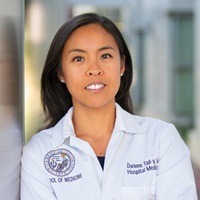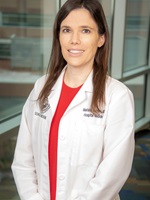Administrative Scholars Program
Physician leadership at the executive level has been identified as a critical gap in the healthcare workforce as healthcare has evolved in complexity. Traditional medical training inadequately prepares physicians to step into leadership roles that require an understanding of and ability to manage the complex financial, operational, and regulatory challenges in U.S. healthcare today.
Our team sought to create an experiential program that would prepare future physician leaders to have the knowledge and skills to navigate those challenges.
We are currently looking for 1-2 fellows for this program. Please reach out to Dr. Darlene Tad-y for questions or additional details about the program.
Reach out with Program Questions
Apply for the Program
About the Program
In the current landscape of healthcare systems healthcare delivery, integrated physician – hospital leadership models have provided a pathway for delivering greater value to patients and populations. In the last decade, the role of physician leaders has evolved to incorporate executive and operational responsibility and accountability (Berdan, 2016; Crocitto et al., 2021; Oostra, 2016). This has required physician leaders to enhance their professional development to include training in the business and economics of healthcare, population health, regulatory and advocacy involvement, and navigation of complex, organizational behaviors (Ackerly et al., 2011).
Why Choose Our Program?
At the University of Colorado, structured physician leadership training exists at the undergraduate medical education (UME) and graduate medical education (GME) levels. These programs are both didactic and project based, designed to provide theoretical underpinnings for accomplishing goals within projects that illustrate key challenges and principles of leadership.
We are offering a scholars program with a focus on Administrative Hospital Medicine. This 2-year scholars program gives scholars the flexibility to choose their own adventure in what they want to accomplish and learn in Hospital Medicine. Our core focuses for this program include:
- Operations
- Workforce Management
- Hospital/Clinical Operations
- Innovation
- IT/Digital Tech
- Data Analytics
- Finance
- Business of Medicine
- Transformative Leadership
- Change Management
- Organizational Behavior
Overview
By the end of the scholars program, graduates will have gained knowledge and skills in these domains: physician as executive leader, strategy for healthcare, operations in the healthcare system, and economics of healthcare.
Specific Learning Objectives:
- Define the role of physician as executive health care team leader.
- Describe the unique characteristics of physician executives.
- Delineate effective strategies for future directions for a healthcare organization.
- Make effective business decisions for a healthcare organization based on profit-maximization, supply and demand, demand elasticity, the estimation of production and cost, and pricing.
- Improve efficiency and operating performance of a healthcare organization through analysis and improvement of productivity, quality, timeliness, and flexibility.
Administrative Scholars will benefit from structured, didactic learning and experiential learning that permits the fellows to apply learned concepts throughout their 2-year experience. This includes:
- Completion of a 2-year Executive MBA in Healthcare Administration resulting in the attainment of a Master’s in Business Administration conferred by the University of Colorado Denver School of Business.
- Applied leadership experiences in the hospital environment at the University of Colorado Hospital (UCH).
- Monthly mentoring and advising sessions with Fellowship leaders to guide their learning experience and to ensure optimal learning at each stage.
- At the beginning of their fellowship, each fellow will develop their individualized learning plan and will revisit the plan every six months. Additional key experiences that will be provided to the fellows include: membership on hospital and School of Medicine (SOM) committees, observation/shadowing experiences with key executive leaders, and accountability for a relevant, meaningful leadership initiative.
Learner Assessment and Program Evaluation
- Completion of project and presentation of results/outcomes through scholarly venues and to relevant hospital audiences
- Attainment of MBA degree
- Graduates’ job placement/trajectory
Application Cycles
Application Cycle opens November 1, 2022 and closes March 31, 2023. Fellowship start date is July 1, 2023.
Please use this link to apply for the position: https://cu.taleo.net/careersection/2/jobdetail.ftl?job=28805&lang=en. Everything below are qualifications and application items you are expected to have.
Qualifications
- Medical Doctor or Doctor of Osteopathy
- Completion of 3-year ACGME-accredited internal medicine residency program (or other programs that involve training in internal medicine, such as Medicine/Pediatrics joint residency) and Board-eligibility for the American Board of Internal Medicine
- Must be available to work onsite at the CU Anschutz Medical Campus
- Eligible for faculty appointment with CU School of Medicine and to be privileged and credentialed at the University of Colorado Hospital
Required Application Documents
The following .pdf documents are required to be considered.
1. Letter of Interest
A. A one page statement of interest explaining career aspirations and intended leadership focused areas. Please provide relevant leadership experiences and desired outcomes from participation in the program. Limit statement to 500 words or less.
2. Current Resume/CV
3. Five Professional References; Including name, address, phone number (mobile number if appropriate), and email address.
Applications are accepted electronically ONLY at www.cu.edu/cu-careers.
Questions should be directed to: Dr. Darlene Tad-y, [email protected].
This scholar program has no guarantee of faculty employment beyond the fellowship period nor are graduates required to commit to positions here at the University of Colorado after graduation.
Information on University benefits programs and eligibility is located at: https://www.cu.edu/employee-services/benefits as well as the matrix: https://www.cu.edu/docs/benefit-eligibility-matrix
The University of Colorado is dedicated to ensuring a safe and secure environment for our faculty, staff, students and visitors. To achieve that goal, we conduct background investigations for all prospective employees. Some positions may require a motor
vehicle records check.

Darlene Tad-y, MD | Fellowship Director
Dr. Tad-y is the Associate Chief Medical Officer of Patient Flow at the University of Colorado Hospital. In this role, she oversees efforts to optimize operational efficiency and ensure patients receive the right care, at the right time, in the right setting. In addition, she is Medical Director for Capacity at UCHealth, guiding the strategy for optimal placement of patients within the system. She is an Associate Professor of Medicine at the University of Colorado School of Medicine (CU) where she is an academic hospitalist. She teaches for the Quality and Safety Educators Academy, authored and co-directs the quality improvement curriculum and annual QI pre-course for the American College of Physicians and is an Assistant Editor for the Joint Commission Journal of Quality and Patient Safety. She serves on the Board for the Society of Hospital Medicine and Prime Health.
Dr. Tad-y’s prior leadership roles included Vice President of Clinical Affairs for the Colorado Hospital Association in which she led statewide quality and safety initiatives in Colorado hospitals, oversaw workforce development including physician engagement, hospital emergency preparedness and innovation. She has been a faculty member of CU’s Institute for Healthcare Quality, Safety and Efficiency, and previously served as a director on the Board of Colorado’s state health information exchange, Contexture (parent company of CORHIO).
Dr. Tad-y earned her medical degree from St. George’s University, completed Internal Medicine residency at NYU Langone Hospital – Brooklyn and hospital medicine fellowship at Johns Hopkins Bayview.
Pubmed publications: https://www.ncbi.nlm.nih.gov/pubmed/?term=Tad-y+darlene

Marisha Burden, MD
Marisha Burden, MD, FACP, SFHM is the Division Head of Hospital Medicine and Associate Professor of Medicine at the University of Colorado School of Medicine. Dr. Burden completed her medical degree at the University of Oklahoma School of Medicine graduating with the honor of Alpha Omega Alpha. She completed her residency at the University of Colorado in the hospitalist training track. Dr. Burden’s interests include building a thriving workforce and building clinical staffing models that support the workforce to do their best work; this in turn drives outstanding patient and institutional outcomes. She has led numerous clinical innovations including building novel clinical service lines and building large scale surge plans for the COVID-19 pandemic. She also devotes considerable time and effort to mentoring, faculty advancement, and educational efforts. Dr. Burden dedicates her time to many diversity, equity, and inclusion efforts. She is the Co-Founder and Co-Chair for the Society of Hospital Medicine Diversity, Equity, and Inclusion Special Interest group. Dr. Burden utilizes research methods to develop and understand best practices. She is the co-lead for the Hospital Medicine ReEngineering Network (HOMERuN) Research Network Workforce Planning Group, principal investigator on an Agency for Healthcare Research and Quality study “Discharge in the AM: A Randomized Control Trial of Physician Rounding Styles to Improve Hospital Flow”, and recently received a Total Worker Healthâ Pilot Grant to study hospitalist work.

Emily Gottenborg, MD
Emily Gottenborg, MD, is an Associate Professor within the Division of Hospital Medicine at the University of Colorado, with an interest in system redesign, patient safety, and leadership in the healthcare setting. She has received advanced training during a Chief Residency in Quality Improvement and Patient Safety at the University of California, San Francisco, as well as through Intermountain Healthcare's Advanced Training Program, and the Institute for Healthcare Quality, Safety, and Efficiency. Dr. Gottenborg is faculty within the Institute for Healthcare Quality, Safety and Efficiency (ihqse.org) where she specializes in coaching frontline clinical teams in improvement work, and has multiple educational roles within the University, teaching learners of all levels and across the health professions about principles of medical leadership and quality improvement.
Ackerly, D. C., Sangvai, D. G., Udayakumar, K., Shah, B. R., Kalman, N. S., Cho, A. H., Schulman, K. A., Fulkerson, W. J., & Dzau, V. J. (2011). Training the Next Generation of Physician–Executives: An Innovative Residency Pathway in Management and Leadership: Academic Medicine, 86(5), 575–579. https://doi.org/10.1097/ACM.0b013e318212e51b
Berdan, B. E. (2016). Physician Leadership in a Changing Healthcare Environment: Frontiers of Health Services Management, 32(3), 27–32. https://doi.org/10.1097/01974520-201601000-00004
Crocitto, L., Kapoor, D. A., & Loughlin, K. R. (2021). Development of Physician Leaders. Urologic Clinics of North America, 48(2), 179–186. https://doi.org/10.1016/j.ucl.2021.01.002
Oostra, R. D. (2016). Physician Leadership: A Central Strategy to Transforming Healthcare: Frontiers of Health Services Management, 32(3), 15–26. https://doi.org/10.1097/01974520-201601000-00003